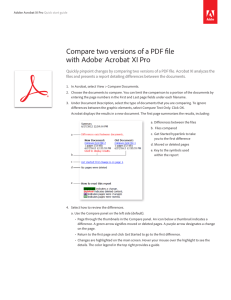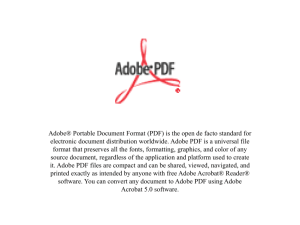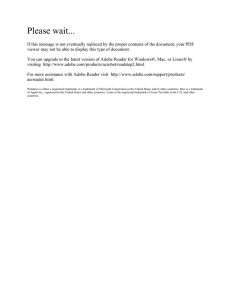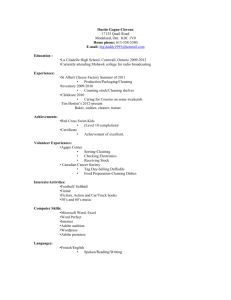Notes
advertisement
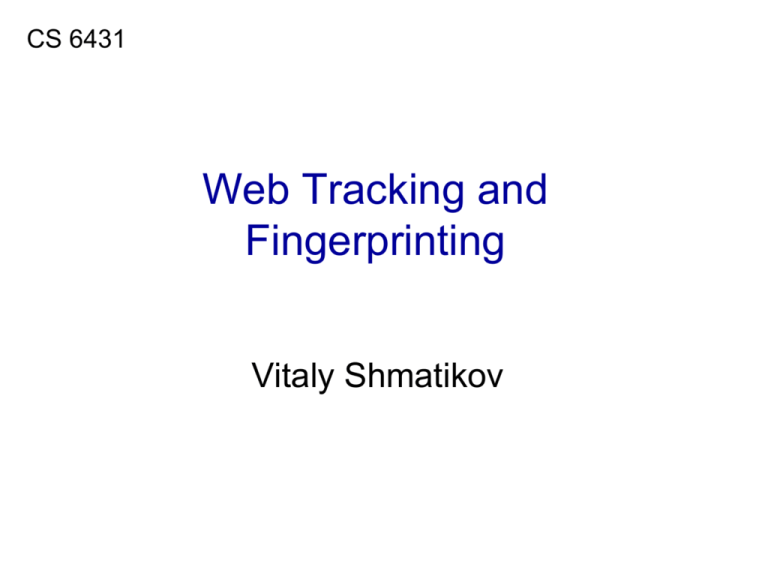
CS 6431
Web Tracking and
Fingerprinting
Vitaly Shmatikov
It’s the Internet! Of course they know you’re a dog.
They also know your favorite brand of pet food and
the name of the cute poodle at the park that you
have a crush on!
slide 2
Tracking via Cookies
Cookie: value set by Web server, automatically
sent by the browser on subsequent requests to
same(ish) origin
Link two sessions at same site
Link sessions between different sites (thirdparty cookies)
Can be combined with user-identifying
information
slide 3
Third-Party Tracking
Third-party cookies:
• Disabled by default (Safari)
• Can be disabled by user
(many browsers)
• Cannot be disabled (Android)
… but there are many other
tracking technologies
slide 4
Behavioral Targeting
Ad network
Advertisers
Publishers
slide 5
Partial List of Ad Networks
slide 6
slide 7
slide 8
Tracking Is Pervasive
64
independent tracking mechanisms in an
average top-50 website
slide 9
Sticky Tracking
Subverting same origin policy
(publisher also runs an ad network)
ad.hi5.com = ad.yieldmanager.com
Flash cookies
Browser fingerprinting
History sniffing
slide 10
Cookie Syncing
Site A informing site B about user’s identity
(via user’s browser)
Allows aggregation across multiple trackers
slide 11
Tracking Technologies
HTTP Cookies
HTTP Auth
HTTP Etags
Content cache
IE userData
HTML5 protocol and
content handlers
HTML5 storage
• Flash cookies
• Silverlight storage
• TLS session ID &
resume
• Browsing history
• window.name
• HTTP STS
• DNS cache
slide 12
Everything Has a Fingerprint
slide 13
Fingerprinting Web Browsers
User agent
HTTP ACCEPT
headers
Browser plug-ins
MIME support
Clock skew
•
•
•
•
Installed fonts
Cookies enabled?
Browser add-ons
Screen resolution
slide 14
Your browser fingerprint appears to be
unique among the 3,435,834 tested so far
slide 15
Panopticlick Example
Plugin 0: Adobe Acrobat; Adobe Acrobat Plug-In Version 7.00 for Netscape; nppdf32.dll; (Acrobat Portable
Document Format; application/pdf; pdf) (Acrobat Forms Data Format; application/vnd.fdf; fdf) (XML Version of
Acrobat Forms Data Format; application/vnd.adobe.xfdf; xfdf) ( Acrobat XML Data Package;
application/vnd.adobe.xdp+xml; xdp) (Adobe FormFlow99 Data File; application/vnd.adobe.xfd+xml; xfd). Plugin
1: Adobe Acrobat; Adobe PDF Plug-In For Firefox and Netscape; nppdf32.dll; (Acrobat Portable Document
Format; application/pdf; pdf) (Adobe PDF in XML Format; application/vnd.adobe.pdfxml; pdfxml) (Adobe PDF in
XML Format; application/vnd.adobe.x-mars; mars) (Acrobat Forms Data Format; application/vnd.fdf; fdf) (XML
Version of Acrobat Forms Data Format; application/vnd.adobe.xfdf; xfdf) ( Acrobat XML Data Package;
application/vnd.adobe.xdp+xml; xdp) (Adobe FormFlow99 Data File; application/vnd.adobe.xfd+xml; xfd). Plugin
2: Google Update; Google Update; npGoogleOneClick8.dll; (; application/x-vnd.google.oneclickctrl.8; ). Plugin 3:
Microsoft® Windows Media Player Firefox Plugin; np-mswmp; np-mswmp.dll; (np-mswmp; application/x-mswmp; *) (; application/asx; *) (; video/x-ms-asf-plugin; *) (; application/x-mplayer2; *) (; video/x-ms-asf;
asf,asx,*) (; video/x-ms-wm; wm,*) (; audio/x-ms-wma; wma,*) (; audio/x-ms-wax; wax,*) (; video/x-ms-wmv;
wmv,*) (; video/x-ms-wvx; wvx,*). Plugin 4: Move Media Player; npmnqmp 07103010; npmnqmp07103010.dll;
(npmnqmp; application/x-vnd.moveplayer.qm; qmx,qpl) (npmnqmp; application/x-vnd.moveplay2.qm; )
(npmnqmp; application/x-vnd.movenetworks.qm; ). Plugin 5: Mozilla Default Plug-in; Default Plug-in; npnul32.dll;
(Mozilla Default Plug-in; *; *). Plugin 6: Shockwave Flash; Shockwave Flash 10.0 r32; NPSWF32.dll; (Adobe Flash
movie; application/x-shockwave-flash; swf) (FutureSplash movie; application/futuresplash; spl). Plugin 7:
Windows Genuine Advantage; 1.7.0059.0; npLegitCheckPlugin.dll; (npLegitCheckPlugin; application/WGA-plugin;
*).
84% of browser fingerprints are unique
With Flash or Java, 94% are unique
slide 16
<CANVAS>
Programmatic drawing in the browser
• Draw shapes, add text, 3D (via WebGL)
Access to drawn pixels
• Array of RGBA values
• PNG-encoded data URL
slide 17
Text Rendering …
<script type="text/javascript">
var canvas =
document.getElementById("drawing");
var context = canvas.getContext("2d");
context.font = "18pt Arial";
context.textBaseline = "top";
context.fillText("Some letters", 2, 2);
</script>
slide 18
… Text Inspection
<script type="text/javascript">
var canvas =
document.getElementById("drawing");
var context = canvas.getContext("2d");
context.font = "18pt Arial";
context.textBaseline = "top";
context.fillText("Some letters", 2, 2);
var pixels =
canvas.toDataURL("image/png");
</script>
slide 19
WebFonts
Problem: Clients ship with ugly fonts
Solution: Browsers should download fonts from
the Internet on demand!
@font-face { font-family: 'Sirin Stencil';
font-style: normal; font-weight: 400; src:
url(http://themes.googleusercontent.com/stat
ic/fonts/sirinstencil/v1/[...].woff)
format('woff');}
slide 20
45 Ways To Sirin Stencil
context.font = "12pt 'Sirin Stencil'";
Windows
OS X
Linux
slide 21
Canvas Fingerprinting
[Mowery and Shacham.
“Pixel Perfect”. W2SP 2012]
Reveals:
• Operating system family
• Browser family
(except Chrome, Safari on OS X)
• Installed fonts
• Font smoothing parameters
slide 22
How Pervasive?
[Acar et al. “The Web Never
Forgets”. CCS 2014]
Present in 5.5% of top 100,000 websites
Fingerprinting code comes from 20 different
domains
• addthis.com by far the most popular (95%)
Draws
Cwm fjordbank glyphs vext quiz
into the canvas
Why this text?
slide 23
“Don’t Worry, It’s All Anonymous”
Is it?
What’s the difference between
“anonymous”
“pseudonymous”
“identified”
Which technology changed data collection from
anonymous to pseudonymous?
slide 24
How Websites Get Your Identity
Third party is sometimes the site itself
Leakage of identifiers
GET http:/
/ad.doubleclick.net/adj/...
Referer: http:/
/submit.SPORTS.com/...?email=jdoe@email.com
Cookie: id=35c192bcfe0000b1...
Security bugs
XSUH: cross-site URL hijacking
Third party buys your identity
slide 25
slide 26
History Sniffing
How can a webpage figure out which sites you
visited previously?
Color of links
• CSS :visited property
• getComputedStyle()
Cached Web content timing
DNS timing
slide 27
Identity Sniffing
[Wondracek et al. Oakland 2010]
All social networking sites allow users to
join groups
Users typically join multiple groups
• Some of these groups are public
Group-specific URLs are predictable
Intersection of group affiliations acts as a
fingerprint
• Can sometimes infer identity by computing
the intersection of group membership lists
slide 28
One-Click Fraud
[Cristin et al. CCS 2010]
Thank you for your patronage! You successfully registered for our premium
online services, at an incredible price of 50,000 JPY. Please promptly send
your payment by bank transfer to ABC Ltd at Ginko Bank, Account
1234567. Questions? Please contact us at 080-1234-1234.
Your IP address is 10.1.2.3, you run Firefox 3.5 over Windows XP, and you
are connecting from Tokyo.
Failure to send your payment promptly will force us to mail you a postcard
reminder to your home address. Customers refusing to pay will be
prosecuted to the fullest extent of the law. Once again, thank you for your
patronage!
slide 29
One-Click Fraud
Estimated costs to victims:
USD 260 million / year
What’s going on here?
Why only Japan?
• Cultural factors:
susceptibility to authoritative language
threat of public shaming
Credible because the website
does have your real identity!
slide 30
Instant Personalization
Creepy is the new normal
slide 31
Do Not Track
Basics
Privacy protections
HTTP header
No tracking across sites
• DNT: 1
– Who is the “third” party?
Can’t be based on domain
Example: amazonaws.com, ad.hi5.com …
Standardization
No intrusive tracking
Browser support in FF4, IE9
Limits on regular log data
Beginning to see adoption
(AP, NAI)… or not
Exceptions for fraud
prevention, etc.
slide 32
DNT Adoption Issues
“But the NAI code also recognizes that companies sometimes
need to continue to collect data for operational reasons that
are separate from ad targeting based on a user’s online
behavior. For example, online advertising companies may
need to gather data to prove to advertisers that an ad has
been delivered and should be paid for; to limit the number of
times a user sees the same ad; or to prevent fraud.”
Translation: we’re going to keep tracking you, but
we’ll simply call it “operational reasons.”
slide 33
Brave New World?
How are these identifiersToday,
different
we are announcing the
launch of Atlas. We’ve
from third-party cookies?
Google AdID
rebuilt Atlas from the ground
up to tackle today’s
marketing challenges, like
reaching people across
devices and bridging the gap
between online impressions
and offline purchases
slide 34

